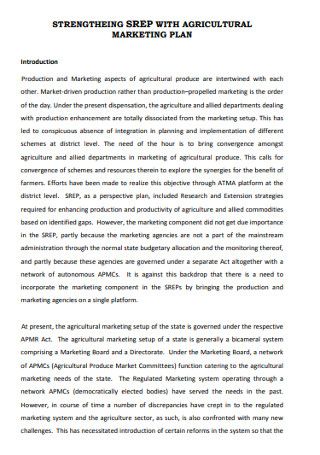
A Marketing Strategy for Agricultural Enterprise Development
In today's rapidly evolving agricultural landscape, marketing plays a pivotal role in the growth and success of agricultural enterprises. Effective marketing strategies are crucial for positioning agricultural products, reaching target markets, and driving sustainable business development. This article explores key considerations and strategies to help agricultural enterprises cultivate success through a well-rounded marketing approach.
Understanding the Target Market:
To develop an effective marketing strategy, it is essential to gain a deep understanding of the target market. Agricultural enterprises must identify their ideal customers, their preferences, and their needs. This can be accomplished through market research, surveys, and analyzing industry trends.
By understanding consumer behavior and market demands, enterprises can tailor their products and messaging to meet the needs of their target audience.
Product Differentiation and Value Proposition:
In an increasingly competitive market, agricultural enterprises must differentiate their products to stand out from the crowd. Identifying unique selling points and communicating the value proposition effectively is essential. Whether it is through organic farming practices, sustainable production methods, superior quality, or unique product attributes, enterprises should highlight what sets them apart from competitors.
This differentiation will not only attract customers but also build brand loyalty and establish a strong market presence.
Digital Presence and Online Marketing:
In today's digital age, establishing a strong online presence is critical for agricultural enterprises. A well-designed website, engaging social media platforms, and targeted online advertising can help reach a wider audience and create brand awareness. Platforms like Facebook, Instagram, and LinkedIn can be leveraged to share success stories, promote products, and engage with customers directly.
Additionally, optimizing websites for search engines (SEO) and utilizing content marketing can enhance visibility and drive organic traffic to the enterprise's digital platforms.
Building Relationships and Partnerships:
In the agricultural industry, building strong relationships with stakeholders is paramount. Collaborating with suppliers, distributors, retailers, and even customers can enhance market reach and establish a network of support. For example, forming strategic partnerships with restaurants, farmers' markets, or grocery stores can lead to increased product exposure and access to larger customer bases.
Furthermore, actively engaging with customers through loyalty programs, feedback mechanisms, and personalized communication can foster customer loyalty and generate valuable word-of-mouth recommendations.
Investing in Branding and Packaging:
An effective marketing strategy goes beyond the product itself. The branding and packaging of agricultural products can significantly impact consumer perception and purchasing decisions. Investing in professional branding, eye-catching packaging, and clear labeling can enhance product visibility, build trust, and differentiate the enterprise from competitors.
Utilizing eco-friendly and sustainable packaging options can also appeal to environmentally conscious consumers, aligning with current market trends.
Embracing Innovative Marketing Techniques:
Agricultural enterprises should stay up to date with the latest marketing techniques and technologies. This could include exploring avenues such as influencer marketing, video content, and augmented reality experiences. Collaborating with influencers or creating engaging video content showcasing the enterprise's farming practices or product journey can resonate with consumers who seek transparency and authenticity.
Embracing innovative marketing techniques demonstrates adaptability and helps to capture the attention of a tech-savvy customer base.
Monitoring and Measuring Success:
No marketing strategy is complete without monitoring and measuring its effectiveness. Agricultural enterprises should establish key performance indicators (KPIs) aligned with their marketing goals. This could include metrics such as sales growth, customer acquisition rate, customer satisfaction, website traffic, and social media engagement.
Regularly tracking these KPIs enables enterprises to evaluate the success of their marketing efforts, identify areas for improvement, and make informed decisions for future marketing campaigns.
In the modern agricultural landscape, a well-rounded marketing strategy is essential for the growth and development of agricultural enterprises. By understanding the target market, differentiating products, establishing a strong digital presence, building relationships, investing in branding, and embracing.


